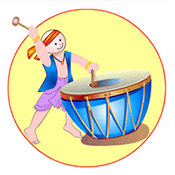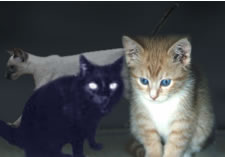
Dimdima
Online Children's Magazine from India

Dimdima
Online Children's Magazine from India
By Rani Iyer

Cats were first domesticated in Egypt about 4000 years ago. It is now commonly believed that the African wildcat and the jungle cat were the ancestors of today's domestic cat. The evolution of the domestic cat took place over extended periods of several thousand years. They were used by ancient Egyptians to control rats and other pests that attacked their stored food. Cats were revered as gods. Ancient Egyptians imposed death penalty for killing a cat. Royal cats were mummified before being buried. When they died, their owners shaved off their eyebrows in mourning.
After it reached Europe, it flourished as house pets. During middle ages, cats were associated with the devils and witches. But by eighteenth century, cats became household pets worldwide.
Although they have descended from wild cats, the domestic cats continue to retain some of the characteristics from their wild ancestors. The arresting eyes, body shape, feeding and grooming habits, independence, ability to pounce, and gleaming fur are some traits common with its wild relatives.
Around the world, domestic cat breeding is a very large and profitable operation. The first cat show was held in 1871 in London, where a Persian breed was declared a winner. Persians originated from Central Asia and were brought to Europe in the seventeenth century. Many decades later, breeds of longhaired cats like Persian, and Siamese was a rage among cat enthusiasts. The most striking feature of the Persian cat is its full, long coat. This unique look is due to a combination of long undercoat and long topcoat. The long beautiful coat needs constant care and grooming. Even though most Persians suffer from Polycystic Kidney Disease, a genetically inherited condition, they continue to remain popular.
These days domestic cats are bred to meet the fancier demands of the cat owners. Some Persians today have a flat nose, or hardly any nose and are most fancied by cat owners. Some breeds have no tail at all! Cats are bred for their coat colors: orange, red, blue or white. Like racehorses, some cats have pedigree! There are about 36 recognized breeds of pedigree cats around the world. Siamese is one of the most popular pedigree breeds.
The domestication of the cat throughout the human history is an example that man can live in harmony with other species. The earlier cats were bred to catch vermins and pests, while the modern ones are bred for a more sedentary lifestyle. In many homes, cats are companions. The fascination of man with cats will continue for several centuries to come. Because of that, we should take greater care to conserve the relatives in the wild.
Last updated on :11/24/2003
EXPLORE MORE...
COMMENT ON THIS ARTICLE
Wants to share something related to this article? Please use the form below.
Dimdima is the Sanskrit word for ‘drumbeat’. In olden days, victory in battle was heralded by the beat of drums or any important news to be conveyed to the people used to be accompanied with drumbeats.
Bharatiya Vidya Bhavan
K. M Munshi Marg,
Chowpatty, Mumbai - 400 007
email : editor@dimdima.com
Bharatiya Vidya Bhavan
505, Sane Guruji Marg,
Tardeo, Mumbai - 400 034
email : promo@dimdima.com
Dimdima.com, the Children's Website of Bharatiya Vidya Bhavan launched in 2000 and came out with a Printed version of Dimdima Magazine in 2004. At present the Printed Version have more than 35,000 subscribers from India and Abroad.